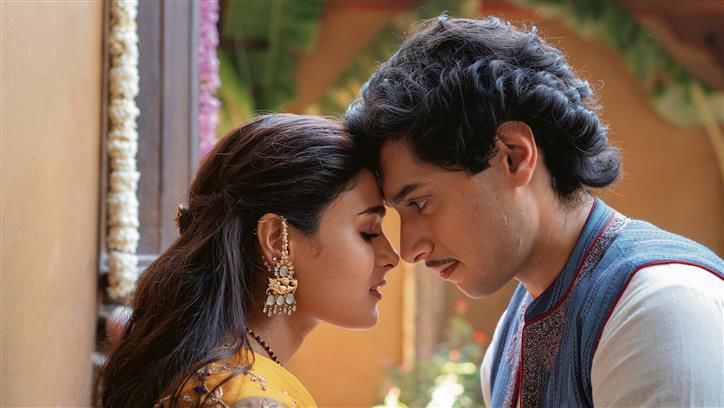Film: Maharaj
Director: Siddharth P Malhotra
Cast: Junaid Khan, Jaideep Ahlawat, Sharvari Wagh, Shalini Pandey
Vikrant Parmar
It’s a fight between good and evil — everyone knows who wins, right? In the Netflix movie Maharaj the course is the same, only the route full of potholes! But before that, why are the religious sentiments of Indians hurt so easily? Or, is it a marketing gimmick? Whatever be the case, thankfully, the Gujarat High Court set the record straight and that too fast enough for this film to see the light of day.
Based on Saurabh Shah’s book Maharaj, this 2-hour-11-minute fare from the YRF stable, fails on many fronts. Based on true events that led to the Maharaja Libel case of 1862, Maharaj opens in Vadaal, Gujarat. In a deeply religious, rather bigoted Vaishnav family, a son, Karsandas Mulji (Junaid Khan), is born, who soon questions all that does not appear right to him. Sadly, his mother passes away and he is transported to a relative’s house in Mumbai. Growing up, he becomes a social reformer and journalist who abhors ill-practices of the time — child marriage, ban on widow remarriage and untouchability. Guided by the ‘Grand Old Man of India’, Dadabhai Naoroji, and others of his ilk, he takes up cudgels against a sea of atrocities; first through the former’s newspaper, Rast Goftar, and then his own, Satyaprakash.
Situation and circumstance make Karsandas cross swords with the affluent and influential Jadunath Maharaj aka JJ (Jaideep Ahlawat), a deified figure who rules a haveli that is pious to the Vaishnav community. However, JJ sexually exploits their daughters and sisters at will, all in the name of religion, devotion and service. Well, isn’t the name JJ akin to one of the villains of Bollywood films of the 70s — remember KK, PK, DK? As if villainy needs an acronym like this. It’s jarring, informal and ultra-modern for a milieu the film is set in — JJ for a godman who calls the shots, holds sway over a multitude of blind followers!
The story reaches a crescendo as the hero takes on the villain, not with his fists but unwieldy dialogues, after Karsandas’ fiancée Kishori (Shalini Pandey) commits suicide, following a ritual called charan seva, a coinage that means sleeping with the baba, JJ, a veritable sexual predator with voyeuristic inclinations. Rest follows in the courtroom, as funnily dressed English lawyers of the time take potshots at each other. And then, good wins over evil. Recollect the first line?
Junaid Khan, son of acclaimed actor Aamir Khan, has a huge comparison to face but he fails the test and that too by some margin. Childish in his countenance as well as act, Junaid is a bit too shrill, almost eating into his dialogues in the eagerness to deliver them. As if learnt by rote, likely to be forgotten and so the hurry! Had Jaideep Ahlawat not performed way below par than he usually does, Junaid would have paled into insignificance. Thankfully, with a fixated smile and assumed persona, Jaideep allows that space to him. The women, including Viraaj (Sharvari Wagh) and Kishori, add a semblance of respect to this drab affair.
The dialogues are full of gyan, almost preachy at times —Dharam bhagwan ban ne ka madhyam nahi hai, acha insaan ban ne ka madhyam hai; Sahi aur galat ka bhed jan ne mein dharam ki nahi, buddhi ki zaroorat hoti hai; Naam se karam nahi, karam se naam banta hai’... clapping!
Weak screenplay and direction bury this story which had potential. Aha, there is a transgender servant of JJ too; it’s of course the mood of the times (read inclusivity). The background score is melodious, but can that hold it all together? Not quite!














